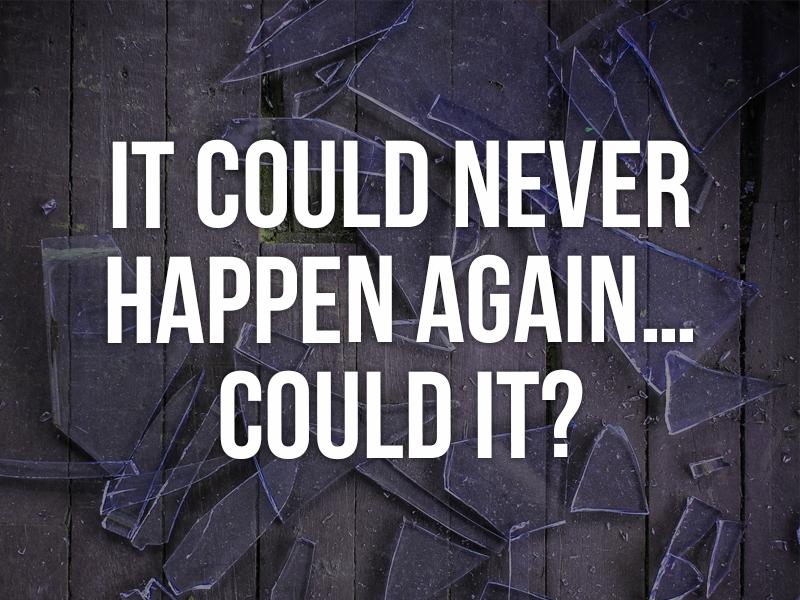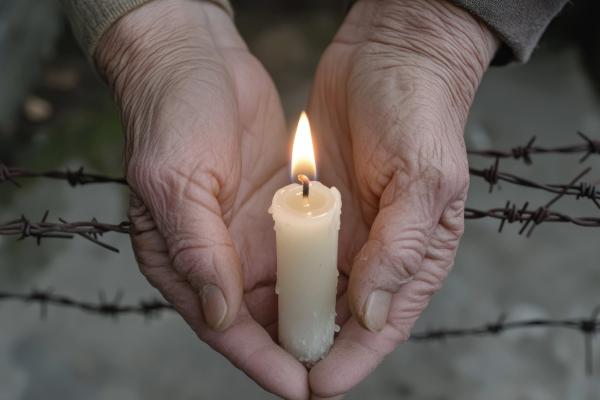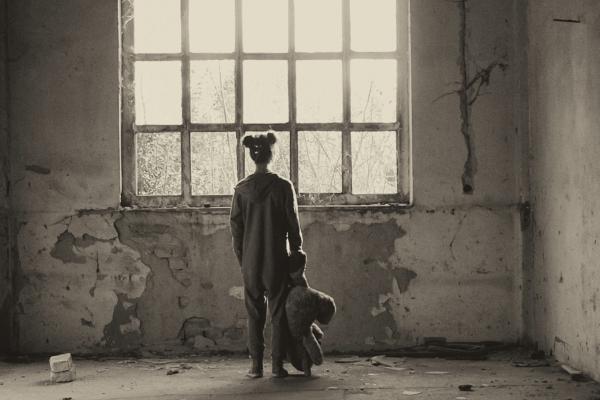
Jeremiah 17:9 says, “the heart is deceitful above all things.” The New King James goes on to say it is “desperately wicked” while the Tree of Life Version calls it “incurable.” That’s a startling verse, and it’s tough to see that it includes no caveats indicating it’s only referring to “the really bad people.” The Bible boldly claims that we all have wickedness in our hearts, and therefore, we’re all vulnerable to getting carried away by it.
Mob Mentality
Eighty-one years ago, Michael Bruce witnessed atrocious examples of what’s called a mob mentality. On the night of November 9–10, 1938, pre-orchestrated riots took place across Germany and Nazi-held regions of Europe. The night became known as Kristallnacht, the Night of Broken Glass. Hitler had primed citizens with propaganda, lies and prejudice about the Jewish people. He’d manipulated the wickedness latent in the human heart, and then gave opportunity for it to unleash itself on the Jewish people.
Amped-up citizens watched as the Gestapo rounded up Jewish men. Soon, the crowds formed into angry mobs rampaging through Jewish homes, smashing glass, destroying furniture and hunting down men to arrest for the “crime” of being Jewish.
Mr. Bruce, a Gentile Englishman, saw firsthand how people could be seduced over the edge by a mob and engage in frenzied behavior not typical of their ordinary lives. Michael Bruce witnessed the feral hatred of Kristallnacht.
He watched an angry crowd erupt into wild cheers when they saw flames emerge from one end of the town’s synagogue. Then, they “surged ahead and, with greedy hands, tore seats and woodwork from the building to feed the flames,” Bruce said. On that night, across the Third Reich’s strongholds, people yanked Torah scrolls and Jewish prayer books from synagogues, ripped and trampled them and threw them into fires.
Mr. Bruce stood astonished and watched as part of the mob headed toward a Jewish man’s store. He followed and noticed mounds of granite blocks that, just that day, had been piled in front of the store, supposedly for repairing the road. He described “youths, men and women, howling deliriously” as they “hurled the blocks through the windows and closed doors.” Bruce said that the doors gave way within a few minutes, and “the mob – shouting and fighting – surged inside to pillage and loot.”
Mr. Bruce also saw an acquaintance trying to protect an elderly Jewish woman who had been dragged from her home. “By now, the streets were a chaos of screaming bloodthirsty people,” he noted. He pushed through to help, and between the two men, they rescued the woman from the fray.
Bruce and his friend turned to witness the throng, “eager for fresh conquests,” flow down a side road – toward the Jewish children’s hospital. Inside, sick and crippled children lay unsuspecting in their beds, many of them suffering from tuberculosis. In the mere minutes before the men caught up on that cold November night, the mob had shattered the hospital’s windows and forced the doors open. Bruce recounted that when they arrived, the mob was “driving the wee [ones] out over the broken glass, bare-footed and wearing nothing but their nightshirts.”
The Power of Persuasion
Fast forward to 1973. In a Connecticut middle school, a young, first-time teacher named Les Levitt created a lesson plan about totalitarianism. He suggested to his seventh-grade students that they should have a Student Bill of Rights. The class quickly got on board. They made armbands in protest of their supposed violated rights and created a flag for their movement.
Mr. Levitt organized the students into a military hierarchy with various roles and responsibilities, and the students called him General. Administrators participated in the exercise by enacting restrictions designed to rile the seventh-graders. Over a few weeks, the notion of taking over the seventh grade grew into taking over the whole school. “The more we drew you in,” Mr. Levitt recalled to former students, “the more you lost sight of what was going on around you.”
Finally, with a crowd of students engaged in a sit-in protest at the school office, the principal and Mr. Levitt announced it had all been an experiment, an object lesson about how totalitarian governments can take over. The students were stunned. Some admitted to feeling used, but mostly, they remember the lesson. One female participant said, “I remember sitting back in my seat thinking, ‘I can’t believe I let myself be so controlled by these people.’”
“I think we all have a dark side,” said another student interviewed 26 years after the exercise. “The lesson here for me is: [I was a] kid who was well-raised, respectful, worked hard, wanted to please her parents, wasn’t rebellious, tried to be a good sister – I was the kid I think you want all kids to be. And yet… I was the perfect little Nazi.”
Take Note
What do these two different stories from 35 years apart reveal? That people – individuals, societies, even neighborhoods and seventh-grade classes – are susceptible to pack influence and falling for lies that result in diseased thinking.
The beginnings of extreme mindsets are often small enough to allow the masses to view them as inconsequential or isolated. But Kristallnacht and Mr. Levitt’s seventh-grade exercise show us how carefully laid propaganda and persuasion can manipulate and ramp up human fervor. And we cannot forget that God says the heart is deceitful and contains desperate and incurable wickedness.
Though the Holocaust ended, anti-Semitism did not. We hear about the worst incidents on the news, but recently, there have been close to 2,000 additional anti-Semitic-motivated occurrences of harassment, vandalism or assault each year in the United States alone. The same is happening worldwide as well. Anti-Semitism is alive and increasing.
Something like Kristallnacht could happen again to the Jewish people. There are those whose actions indicate they would like nothing more than to stoke anti-Semitism’s flames and set off sparks in ordinary people who would never suspect themselves capable of getting carried away like the townsfolk during Kristallnacht or the seventh-graders in Connecticut.
We must take note and be watchful. As Holocaust anniversaries come around on our calendars, we are reminded of how far anti-Semitic prejudice can go. And we must remember throughout the year how important it is to speak up against anti-Semitism whenever we encounter it.
Sources:
A Personal Memoir by Michael Bruce, Museum of Tolerance
One Tin Soldier Rides Away, This American Life
Annual Audits of Anti-Semitic Incidents, Anti-Defamation League












